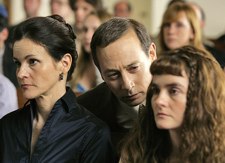REVIEW: Todd Solondz Mines More Dark Intrigues in Life During Wartime
 A man in the grip of contrition, Allen (Michael Kenneth Williams) is re-vowing amends to his wife Joy (Shirley Henderson) in very tight close-up in the opening scene of Life During Wartime. "No more cocaine," he says. "No more crack. No more crack-cocaine." Joy is weepy, pliant, soothing. They are tucked into a restaurant booth, celebrating what seems like a decent stretch of functional couplehood, when a waitress comes to take their order and makes off with their stability instead.
A man in the grip of contrition, Allen (Michael Kenneth Williams) is re-vowing amends to his wife Joy (Shirley Henderson) in very tight close-up in the opening scene of Life During Wartime. "No more cocaine," he says. "No more crack. No more crack-cocaine." Joy is weepy, pliant, soothing. They are tucked into a restaurant booth, celebrating what seems like a decent stretch of functional couplehood, when a waitress comes to take their order and makes off with their stability instead.
Allen is not quite as reformed as he would have his wife believe; he is also no longer Phillip Seymour Hoffman, who played the same, heavy-breathing pervert in Happiness, the 1998 film director Todd Solondz is revisiting in this idiosyncratic update. In the opening of that film Joy was in another restaurant, sharing an equally uncomfortable meal with Andy (then played by John Lovitz), who is since deceased. Andy now appears to Joy as a Paul Reubens-esque apparition when she flees her husband and New Jersey for the South Florida home of her older sister Trish (Allison Janney).
Trish has just met Harvey Wiener (Michael Lerner), father of the also-deceased Dawn and the still socially inverted Mark (Rich Pecci), and during another restaurant meal falls into ecstasies over his every banal revelation. Banal seems perfectly divine, of course, after your first husband is hauled off to jail for drugging and raping your son's young friends. Later she will describe their sex with a surge of relief as "so nooooormal!"
Anxiety around sex and sexuality pervades Life During Wartime, although it can't quite pervert it -- not after all these years, wretched orgasms, and little black boxes over Selma Blair's bare behind. It is an evergreen source for Solondz's provocative, if often self-derivative, look at hypocrisy in relationships with family, romantic partners, and selves. After her date with Harvey, Joy comes home to her pre-adolescent son Timmy (Dylan Riley Snyder), who is all sorts of curious about her elation. When she explains to him that the touch of Harvey's hand on her arm made her wet -- one of countless blithely ill-advised statements she makes throughout -- the question arises: Have adults not been arrested for less?
At times the film plays like a liberal mockumentary: Joy's young daughter pops klonopin with her Lucky Charms; the middle sister, played by Ally Sheedy, is a pointy L.A. nightmare who can't stop announcing her forgiveness and employs the phrase "we're still a country at war" as a triumphant conversation-ender; Mark deflects a question about his personal life by describing the need to focus on China.
Dark to a specific point of dullness or even opacity, Solondz requires patience, as always, but indulgence as well. He relies on your remembrance of his other films and characters but also on your willingness to overlook his redeployment of tactics that range from puerile to mildly -- and somehow always self-skeptically -- profound. If his go-to subversions now trigger reflexive impatience, beyond the throat-clearing there is a mordantly critical, sometimes even compassionate challenge to the idea of a guiding moral universe, whether offered by religion, logic, or experience. Here it is inhabited and explored vigorously by Timmy -- a growing child getting his bearings, ostensibly, so that he may become a man (his bar mitzvah figures prominently). And yet it is a universe visited by actual adults only under compulsion or when convenient.
Timmy's father Bill (Ciarán Hinds) is being released from prison when the film opens, and eventually tracks down his older son Billy (Chris Marquette) at college. Theirs is a crushing reunion in which Bill suggests that biological determinism has overruled any hope of moral substance for him. He had previously met his match and more during a hotel tryst with a hard woman ("Married, alone -- it's the same thing," she says) played by Charlotte Rampling, a misanthrope of abiding indifference who seemed to quash any hope he had of connection with her frankness about the human condition.
Hinds looks like a scary Muppet version of Jon Hamm, his mouth pulled back and down in a mask of permanent dismay. He is not that interested in forgiveness -- in fact most of the characters are not, though many pretend to be -- and seems to have recognized it as a bankrupt concept, at least where he is concerned. In this he has failed to factor in the blindly determined love of his son: "I don't care about freedom and democracy," he sobs, "I just want my father." Whether there's hope for the rest of us is a question left both as open and as clouded as little Timmy's grieving face.

Comments
Where can we go to have an extra marital affair? It seems to me that espoused women plus wedded males gazing to have affairs all go to the same mated dating websites. I believe that its a good thing as well as no one should have to remain loyal to a marriage they dislike very strongly.
Thanks for making the sincere try to provide an explanation for this. I think very strong about it and wish to be told more. If it's OK, as you reach more extensive wisdom, may you mind adding more posts very similar to this one with more information? It could be extraordinarily helpful and helpful for me and my colleagues.